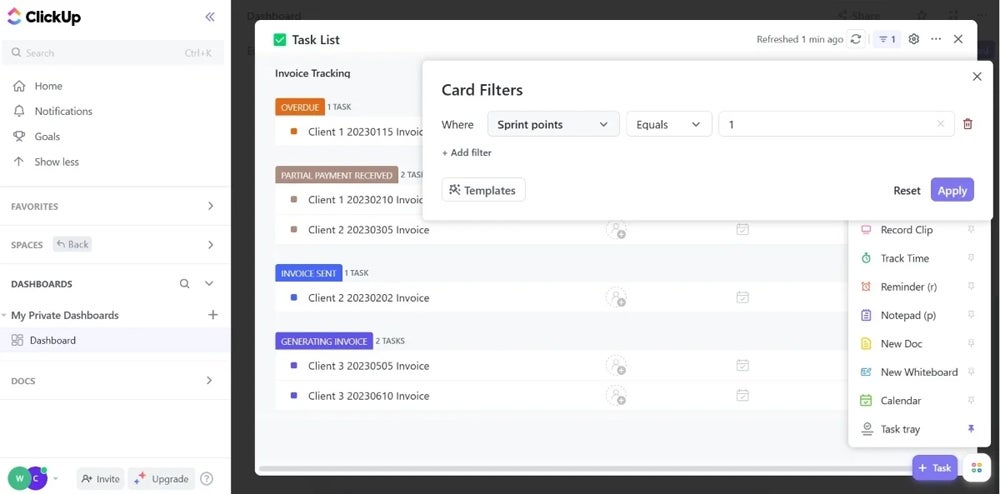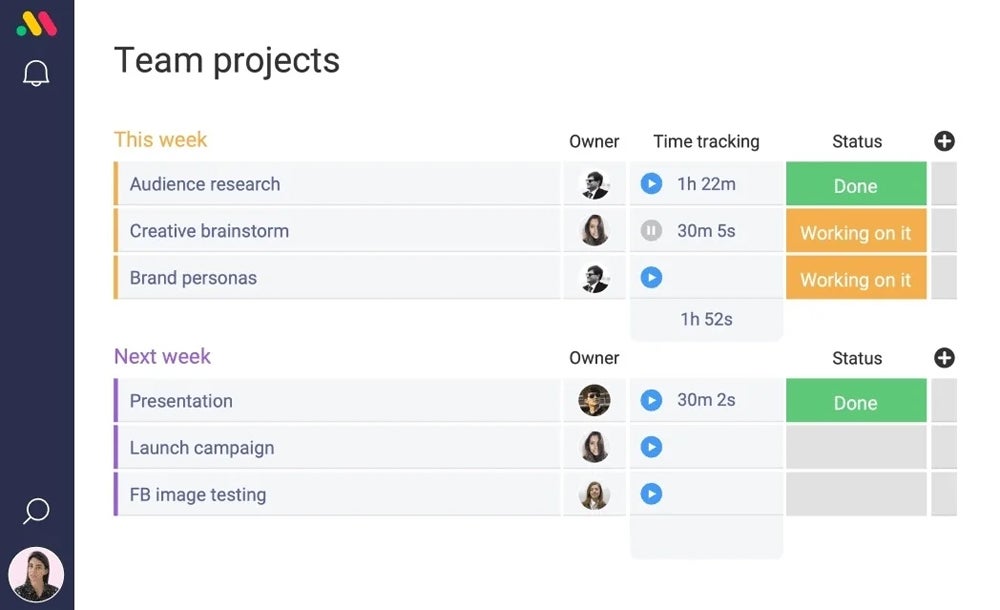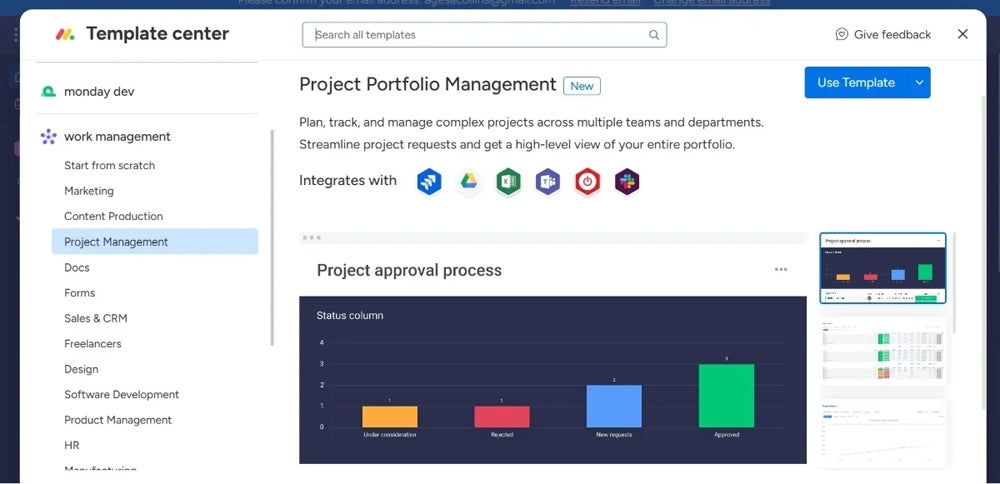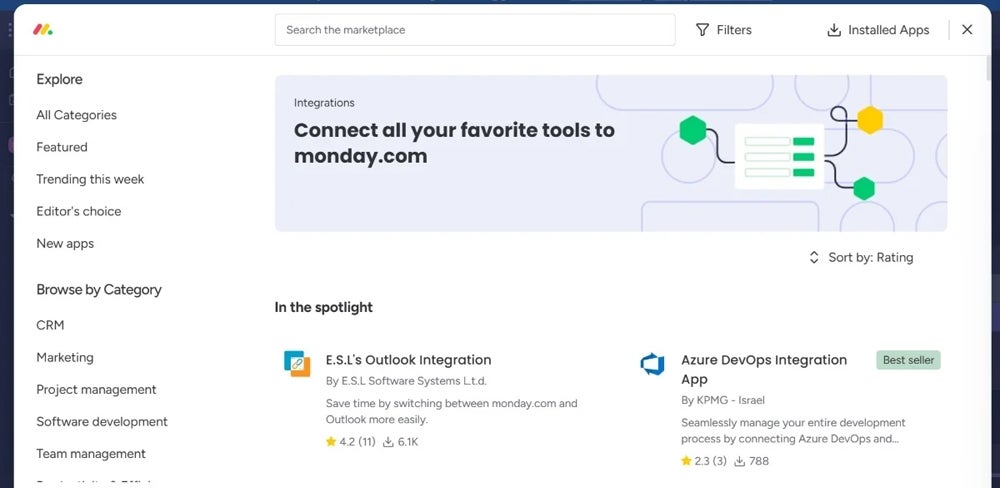[ad_1]
Teams looking for a powerful project management tool often turn to monday work management or ClickUp. The two project management platforms are similar, yet they offer different features.
ClickUp is a versatile all-in-one cloud-based project management tool that enables teams of all structures and sizes to manage projects of varying levels of complexity through tools for time tracking, task management and agile management, among others.
monday work management is a project management software solution that helps users manage teams through a simple, intuitive layout without as many bells and whistles as some platforms, while also helping them with typical workflow tracking and keeping up with their processes.
ClickUp vs. monday.com: Comparison chart
| Features | ||
|---|---|---|
| Templates | ||
| AI | ||
| Integrations | ||
| In-app video recording | ||
| Time tracking | ||
| Multiple views | ||
| Storage on the free plan | ||
| Storage on the paid plan | ||
| Free forever plan | ||
| Starting price (per user per month, billed monthly) |
||
| Starting price (per user per month, billed annually) |
||
|
|
ClickUp vs. monday.com: Pricing
Comparing the two tools, ClickUp is the more budget-friendly option. However, its Free Forever plan comes with only 100 MB maximum storage, far lower than monday.com’s 500 MB. On one hand, as thorough as the pricing structure of monday.com is, it can quickly escalate as you add more team members and need more advanced features. Its free tier’s features are limited too, even for small teams. It is also worth noting that unlike ClickUp, monday.com’s free plan only allows up to two members.
ClickUp pricing
ClickUp offers a variety of pricing plans designed to suit different team sizes and needs. They include:
- Free Forever: This plan is great for personal use, with 100 MB storage, unlimited tasks and unlimited members.
- Unlimited: Priced at $7 per member per month billed annually or $10 when billed monthly
- Business: At $12 per member per month billed annually or $19 when billed monthly
- Enterprise: Its pricing isn’t publicly listed, but it includes enterprise API, advanced permissions and unlimited custom roles.
- ClickUp AI: An add-on to any premium plan for $5 monthly per member
For more in-depth lists of features and analysis, read our full ClickUp review.
monday.com pricing
monday.com offers a tiered pricing model that caters to a variety of needs, from individual freelancers to large enterprises. The pricing plans include:
- Free: This is ideal for individuals or very small teams and includes up to three boards, unlimited docs, 200+ templates and two team members.
- Basic: $9 per seat per month, billed annually, or $12 per seat per month, billed monthly.
- Standard: $12 per seat per month, billed annually, or $14 per seat per month, billed monthly.
- Pro: $19 per seat per month, billed annually, or $24 per seat per month, billed monthly.
- Enterprise: Pricing isn’t publicly listed, meaning that prospective users will have to contact monday.com for a quote.
For more on monday.com, check out our full monday.com review.
ClickUp vs. monday.com: Key features
Agile project management
Winner: ClickUp
ClickUp makes for a good agile project management tool with features like Scrum and kanban boards, sprint dashboards and agile reporting. Between ClickUp and monday.com, ClickUp is a better fit for teams that use the agile software development methodology.
While monday.com is an extensive project management tool, it doesn’t explicitly offer agile project management features. This will likely be a drawback for software development teams or organizations that strictly employ the agile methodology.

Time tracking
Winner: ClickUp
ClickUp offers native time-tracking features including the ability to track time from any device, whether desktop, mobile or web. You can also integrate your favorite time-tracking apps so you can better monitor the time spent on each task in ClickUp. This is particularly attractive to users who already use other time management tools. ClickUp’s built-in time-tracking features are available in all plans, with the Business plan offering more advanced time tracking than the Unlimited plan.
Time tracking is also available in monday.com, allowing team members to log their hours directly within tasks. This comes in handy when you want to bill clients or simply keep track of how much time is spent on specific projects. This feature, however, is only available in the Pro and Enterprise plans.

Multiple views
Winner: ClickUp
ClickUp offers over 15 views for task and project management, with list view, board view, calendar view, timeline view, Gantt chart view and more. This allows users to choose the view that works best for their specific tasks and projects. You can save and share these custom views with your team.
In comparison, monday.com offers seven different views, including timeline, calendar, kanban and map views. While monday.com still offers a variety of options, ClickUp provides users with more flexibility and customization with its wide range of views.
Templates
Winner: ClickUp
ClickUp offers over 1,000 templates spread across a similar range of use cases as monday.com. This access to ready-to-go templates saves project managers time as they set up the boards for each project and line item. ClickUp takes that a step further by allowing users to develop and upload custom templates.
monday work management features many templates across a wide range of industries and use cases to set up and complete a project on time.
Though monday also offers numerous template options, ClickUp’s extensive template library and custom template feature make it the preferred choice for users looking for a robust selection of templates.

Integrations
Winner: ClickUp
ClickUp allows integration with over 1,000 tools. It also ships features and integrations weekly to ensure the app catalog and functionality are constantly expanding.
monday.com, on the other hand, offers more than 200 third-party app integrations, including popular collaboration tools like Slack, Google Drive and Microsoft Teams. This makes work convenient by bringing things into one centralized platform.
But while impressive, compared to the over 1,000 integrations in ClickUp, monday.com falls behind in this aspect.

Customer support
Winner: ClickUp
ClickUp provides 24/7 support for all users on both free and paid plans, so users can reach out for assistance anytime and get immediate help whenever needed. ClickUp offers live chat support for paid plans, allowing users to connect with a support agent for real-time assistance.
As for monday.com, there is a self-serve knowledge base for all users, a valuable resource for finding answers to common questions and troubleshooting tips. For users on paid plans, monday.com provides 24/7 customer support. The platform also offers daily live webinars for those in the paid tiers, which provide an interactive way to learn more about monday.com and its features.
Both ClickUp and monday.com offer additional support options for those on the Enterprise plan. ClickUp has a customer success manager who provides personalized assistance and guidance to help users maximize the platform for their specific needs. ClickUp also offers an onboarding training workshop and access to managed services.
On the other hand, monday.com’s Enterprise users get a dedicated customer success manager who serves as the single point of contact for personalized support and guidance. monday.com offers enterprise users a 99.9% uptime SLA, guaranteeing reliable and consistent platform performance.
ClickUp pros and cons
Pros of ClickUp
- Competitive pricing plans.
- Great customer support.
- Incredibly versatile project management tool.
Cons of ClickUp
- Complexity may stem from its vast array of features.
- Limited free plan, particularly with its 100 MB storage.
- Notifications can be overwhelming.
monday.com pros and cons
Pros of monday.com
- Easy-to-use interface.
- Ability to easily and flexibly centralize work.
- Collaboration features such as real-time messaging.
Cons of monday.com
- Some crucial features are only found in the Pro pricing tier.
- More expensive than ClickUp.
- Limited users in its free plan.
Should your organization use ClickUp or monday.com?
Your needs and layout preferences will determine which platform you should choose. Should you need agile features for your team, alongside a high degree of customization and flexibility, ClickUp is the better choice. However, if your team needs advanced project management features and is willing to spend what’s required to access those features, monday.com is a strong contender.
Both ClickUp and monday.com received a perfect score of 5/5 in our review, indicating that they are both highly regarded task and project management tools. However, based on the features, functionality and pricing comparison between ClickUp and monday.com, ClickUp is the better task management tool for organizations. ClickUp’s intricate task dependencies, various views, a generous free plan and affordable pricing make it a standout choice.
Review methodology
After noting the features they list on their websites, I tested these two project management tools to understand how the features they listed work and to form our insights.
I analyzed the tools across several factors, including features, pricing, ease of use and service and support. This involved thoroughly exploring and assessing each tool’s functionalities, including task management, collaboration features, integrations, views and support. I then compared my findings to those of verified reviewers to see parallels and nuances between our experiences across features, user experience and pricing.
[ad_2]